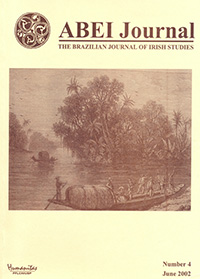The Construction of Identity in John Banville’s The Book of Evidence
DOI:
https://doi.org/10.11606/issn.2595-8127.v4i1p95-111Keywords:
Identity, The Book of Evidence, John BanvilleAbstract
In the present paper, I propose to discuss how I read The Book of Evidence and, echoing Robert Scholes’s words, how I inscribe it into the textuality of my life. Scholes actually says that “...each text can only be read by connecting it to the unfinished work of textuality...” (6) that each person’s reading represents. Therefore, as I read The Book of Evidence, it immediately reminded me of Dostoyevsky’s Crime and Punishment and Capote’s In Cold Blood. At the moment I read these novels, I thought my reading of them complete and closed. Dostoyevsky’s narrative had opened my eyes to the deep psychological anguish of a young man who feels trapped in his social plight and commits a murder only to confirm the famous cliché that crime does not pay and the path of goodness should always be chosen. I remember turning the pages expecting to find some relief after so much despair. Many years later I dared read Capote’s novel. The scene of the merciless massacre of the Clutter family remained with me after a long time as well as the sordid and marginal existence of the murderers and their hopeless path to death. When I took up The Book of Evidence I was ready for the same kind of reading experience. But, in spite of its deep intertextuality with Dostoyevsky’s novel, the unexpected tone of the narration suggested that I should generate a substantially different reading strategy in order to make sense of it.
References
Banville, John. The Book of Evidence. London: Secker &Warburg,1989.
Deleuze, Gilles. “Literature and Life”. Critical Inquiry 23. Winter, 1997. pp.225-229.
Dostoyevsky, Fyodor. Crime and Punishment. London: Penguin Books, 1997.
Fairclough, Norman. Critical Discourse Analysis. London: Longman, 1995.
Foucault, Michel. “The Order of Discourse”. In Modern Literary Theory., P. Rice and Patricia Waugh, eds., GB: Arnold, 1989. pp. 221-233.
Hall, Stuart. “Introduction: Identity in Question”. In Formations of Modernity. Oxford University Press, 1992. pp. 49-61.
____. “Who needs ‘Identity’?”. In Questions of Cultural Identity. London: Sage Publications, 1996. pp.1-17.
Marshall, Brenda K. “Critique of Representation and J. M. Coetzee’s Foe.” and “Critique of Subjectivity and Michel Tournier’s Friday”. In Teaching the Postmodern Fiction and Theory. New York & London: Routledge, 1992. pp.49-97.
Papastergiadis, Nikos. “Tracing Hybridity in Theory”. In: Debating Cultural Hybridity. Multi-Cultural Identities and the Politics of Anti-Racism. Pnina Werber and Tariq Modood, eds. London and New Jersey: Zed Books, 1997. pp. 257-285.
Scholes, Robert. “Reading: An Intertextual Activity”. In Protocols of Reading.New Haven & London: Yale University Press, 1989. pp. 1-50.
Usher, Robin and Edwards, Richard. “The End of the Educational Project”. In Postmodernism and Education. London & New York: Routledge, 1996. pp. 119-135.
Wallerstein, Immanuel. “The Construction of Peoplehood: Racism, Nationalism, Ethnicity”. In Race, Nation, Class. Ambiguous Identities. Balibar Etienne and Wallerstein, Immanuel, eds. London and New York: Verso, 1991. pp. 71-85.
Downloads
Published
Issue
Section
License
Copyright (c) 2002 Cielo Griselda Festino

This work is licensed under a Creative Commons Attribution-NonCommercial 4.0 International License.


